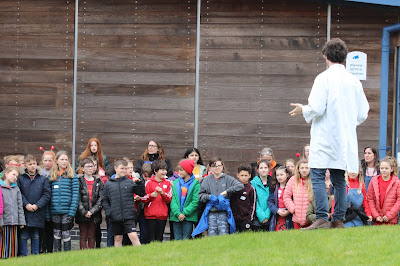The students, all from the foundation degree in Surf Science & Technology at Cornwall College Newquay, have spent ten days on a tour of the Basque Country.
The first stop was the town of Mundaka, on the northern coast of Spain. Mundaka is home to one of the longest left-hand waves in the world, making it an internationally renowned surf destination.
During their stay, the students visited AZTI, a science and technology centre specialising in oceanography, to meet leading research scientist and surfer Pedro Liria.
Pedro gave the students an insight into the Mundaka sandbar, detailing how continued sand dredging of the river mouth has affected the famous waves and the resulting plans for a restoration effort to build an artificial dry sand beach.
The students balanced out their fieldwork with regular surfing excursions and a trip to the coastal city of San Sebastian to soak up the Spanish culture.
Surf Science Programme Manager Chris Selvey from Cornwall College Newquay, described the field trip as “a great opportunity for our students to explore first-hand the implications of human and climatic influences on the environment.”
Chris continued: “Getting hands-on experience carrying out fieldwork in beach topography and oceanography, putting into practice the knowledge they are gaining in the classroom, has been an invaluable experience for the students. Not to mention, the waves have been awesome!”
 The FdSc in Surf Science & Technology at Cornwall College is a unique academic programme that covers aspects relating to the science, sport and industry of surfing. These include the history and culture of surfing, event management, environmental science, human exercise science, principles of psychology and coaching, the design and manufacture of surf boards and the geographical and climatic influences on surfing.
The FdSc in Surf Science & Technology at Cornwall College is a unique academic programme that covers aspects relating to the science, sport and industry of surfing. These include the history and culture of surfing, event management, environmental science, human exercise science, principles of psychology and coaching, the design and manufacture of surf boards and the geographical and climatic influences on surfing. Programme Manager Chris Selvey added: “The course benefits from very close links with many of the major players in the surfing world. Our students have the chance to design and build their own surfboard, take surf coaching, first aid and beach lifeguard qualifications, as well as working in an industry-related environment. If you have an interest in working in the surf industry, the course will give you the skills and experience you need to start your career.”
The second leg of the field trip was spent in the small hilltop town of Bidart, located near Biarritz in Southern France. Students spent more time surfing as well as investigating the impact that man-made structures can have on the marine environment and ecosystems.
Student Dan Priddle moved from Devon to study the course in Newquay. Dan said: “The trip was amazing with lots of laughs shared, many interesting things learnt and some great surfing. Getting up to surf at sunrise in Mundaka is definitely something I’ll never forget. Being able to experience a place I had never been before while surfing, taking in the culture and learning loads along the way was an unforgettable experience. I enjoyed every minute of it!”
For more information on the Surf Science & Technology and Marine Sports Science courses available at Cornwall College Newquay click HERE or call 0330 123 2523.

































